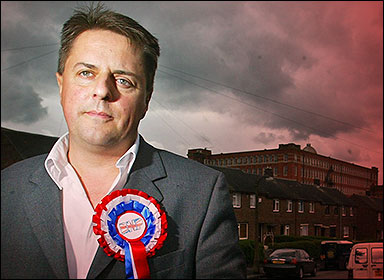Over the last decade Nick Griffin has become one of the most recognisable, reviled and infamous figures in modern politics. In a week that sees the labour faithful flock to Manchester for their annual conference, Griffin was in Northern Ireland at the Ulster Covenant event at Stormont. WeÔÇÖve heard a great deal lately of opinion polls with regards to labour, the independent Comres poll placing them three points above the Conservative party yet the labour leader has not fared so well. His approval ratings far lower to the point where apparently many members of the public donÔÇÖt even know who he is. However the same cannot be said for Nick Griffin, a character who splits public opinion.
Last Saturday was no different as Griffin stirred up the already contentious issue of unionism attacking Catholic republicans via twitter referring to them as ÔÇ£fenian bastards.ÔÇØ As usual this all too typical comment from the leader of the BNP triggered a commendable response of outrage and contempt from both unionist and republicans alike. Nichola Mallon of the SDLP referred to his words as an ÔÇ£incitement to hatred.ÔÇØ Christopher Stalford of the DWP echoed her comments stating: ÔÇ£the values the BNP represent are the antithesis of unionist values.ÔÇØ
For those amongst GriffinÔÇÖs critics who believe this may mark the beginning of his downfall, a watershed moment where he removed his ambiguous public image and revealed himself in his true colours are likely to be disappointed. Once again Griffin has high jacked a public event, in this case the centenary of partition in Ireland and has used it as a mouthpiece for his partyÔÇÖs agenda. Although he stressed his presence at the event, which many civil leaders felt they could have lived without, was as a member of public. His comments have undoubtedly brought his party some much needed publicity.
However, much to the delight of his many critics, his PR stunt may yet backfire. The police have now confirmed they will be investigating his comments which could be interpreted under UK law as inciting racial hatred. Griffin has also been in this position before: the MEP was convicted in 1998 for distributing material likely to incite hatred and received a suspended sentence for his troubles. Later in 2005 he was acquitted for racial hatred. However an arrest and subsequent trial may only bring further publicity and provide him with a soap box from which to preach.
Although this latest gaff may have provided vital publicity and may encourage his supporters, for Griffin personally though this was probably a mistake. For years now he has attempted to make his party look electable; distancing himself from the National Front, the English defence league and holocaust deniers. Portraying his party as one of free speech and as defenders of justice. Language like ÔÇ£Fenian bastartdsÔÇØ is not exactly the words of a statesman and will not endear him to the broader public.
Griffin has refused to withdraw his comments stating: ÔÇ£It wasnÔÇÖt about Catholics; it was about the operatives of the republican grievance exploitation machine.ÔÇØ However this incidence is resolved, the controversy is likely to continue, there will be debate on the role of free speech and social networking in society. ItÔÇÖs interesting to note Griffins comments were made via twitter to a global audience.
WhatÔÇÖs vital is that people do not make the mistake of regarding Griffin as a pantomime villain, largely harmless. His position on immigration, human rights and the holocaust are more than questionable. He should be regarded as a potent threat. Especially in a week that sees Abu Hamza one of the worldÔÇÖs most dangerous terroristsÔÇÖ extradition stall. Griffin may not have an electable appeal but heÔÇÖs still more recognisable to the public than labour leader Ed Miliband.
Luke Smith





Add Comment